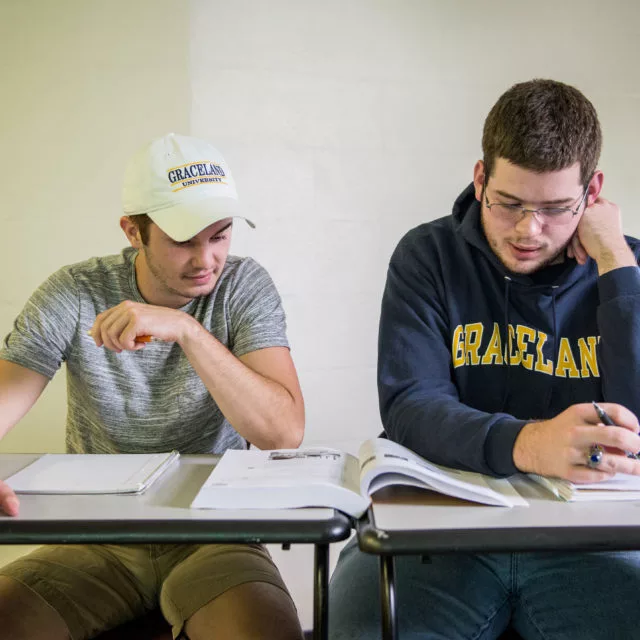At Graceland University, we believe everyone should have access to a college education.
That’s why 99% of our students receive financial aid. Our admissions counselors will work with you personally to figure out the best way to keep your tuition costs manageable so you can focus on getting the most out of your time at Graceland.
Tuition & Fees Scholarships & Financial Aid View Your Financial Aid PackageYour aid package is based on your Expected Family Contribution (EFC) from information reported on your Free Application for Federal Student Aid (FAFSA), academic record, planned participation in athletics or the performing arts, and projected enrollment. Corrections made as a result of verification of information reported on the FAFSA, change in participation activities or less than full-time enrollment could alter the financial aid package. For packages containing federal or state grant aid, awards may be adjusted to stay within awarding guidelines. State, federal, and private grants or scholarships take precedence over Graceland funds.
To be eligible for financial aid, students must be making satisfactory academic progress. Read information on SAP here.
An award notice will be sent to you showing the financial aid in your package. If you do not desire a particular aid source, please contact your financial advisor to have your aid package modified.
Federal (see www.studentaid.gov for more information)
Pell and Supplemental Grants are federal gift awards available to qualifying undergraduate students. Individual awards are based on enrollment status and EFC as determined by the FAFSA. To be eligible for financial aid, students must also be making satisfactory academic progress (SAP).
William D. Ford Federal Direct/Stafford Subsidized and Unsubsidized Student Loans are guaranteed by the U.S. Department of Education. There are different loan maximums based on grade level status. An origination/guarantee fee is charged for each loan from the Department of Education. These loans are available to all students who complete the FAFSA, meet government eligibility requirements and enroll at least half time. They come in two types: subsidized (the government pays the interest for the student until the repayment period begins) and unsubsidized (the student is responsible for the interest from the time the loan is disbursed to the school). The repayment on these loans begins six months after graduation, withdrawing from school or dropping below half-time status. The interest rate on these loans will not exceed 8.25 percent per year.
William D. Ford Federal Direct PLUS Loan is a loan available to the parents of a dependent undergraduate student. The U.S. Department of Education is the guarantee agency. There is an origination/guarantee fee for each loan, and the interest rate cannot exceed nine percent. This loan is in the parents’ name. Payment begins 60 days after the full amount borrowed for the school year has been disbursed. (This usually means that payment begins while the student is still in school.) Financial need is not a prerequisite, but the borrower must pass a credit check performed by the U.S. Department of Education. Loan may be deferred until six months after the student graduates or drops below full-time.
State of Iowa Grant Programs
To be eligible for these types of gift aid, a student must be an undergraduate resident of Iowa and meet the need eligibility requirement of the Iowa College Student Aid Commission. The Iowa Tuition Grant, the best known of this type, can be awarded for up to eight full-time semesters of enrollment. To meet eligibility criteria, a FAFSA must be filed before July 1. In the event that available state funds are insufficient to pay the full amount of each approved Iowa Tuition Grant, the Iowa College Student Aid Commission has the authority to administratively reduce the award.
Federal or Institutional Employment
Federal or institutional employment is financial aid that is earned. Students may obtain jobs on campus to provide for their personal expenses. This aid form is not intended to pay the direct educational costs of tuition, room, board or institutional fees. Federal or institutional employment potential may be part of your aid package. Employment positions are not assigned or guaranteed. Students must seek employment with departments on campus. An employment application and related forms must be completed annually.
Institutional Grants and Scholarships
Institutional grants and scholarships are a form of gift aid provided by Graceland University. There are certain guidelines a student must meet to remain eligible for this aid. Guidelines include being enrolled full-time and maintaining satisfactory academic progress as defined in the Graceland University catalog. Additional rules may apply to specific grants.
Outside Scholarships
Outside scholarships may be another source of educational funding from your community or other organizations. We encourage you to apply for such aid. If you receive any scholarships or grants from outside of Graceland University, notify your financial advisor of the name of the scholarship, the name of the donor and the dollar value. These scholarships become a part of your financial aid package. The funds should be sent to Graceland University and may affect federal or institutional aid eligibility.
Agency Support
Agency support is available to qualifying students by numerous sources. Common agencies that can provide assistance are Vocational Rehabilitation, Social Services, Veteran’s Administration and the Bureau of Indian Affairs. For more information on qualifications and funding, contact the agency counselor in your home area.
The Department of Education requires verification of approximately 30 percent of FAFSAs filed by applicants for aid each year. Therefore, Graceland University will verify FAFSA information on selected applicants. We will request a tax return transcript(s), W-2 form(s) and the verification worksheet to complete this process. Your aid award is subject to change if verification procedures result in a different calculation of financial need. Graceland University’s Verification Policy states no type of federal or state aid can be disbursed to a student’s account until the verification process is complete. A student may waive verification if they do not wish to receive any federal or state aid, including grants. Institutional aid may also be affected when verification is waived. Read the What is Verification document to learn more.
Aid is disbursed equally between fall and spring semesters in the form of credit to your student account. Each individual aid award has requirements that must be met prior to its disbursement. Failure to meet the conditions of an award will result in the delayed disbursement or cancellation of that particular award.
You must reapply for financial aid annually. This is done by filing the FAFSA online (www.fafsa.ed.gov). Federal, state and some institutional aid is not automatically renewable and may fluctuate from one year to the next.
Get a quick estimate on your financial aid options and what you can expect to pay as a first-year undergraduate student at Graceland.
The Net Price Calculator is designed to help you estimate your financial aid options for residential students at Graceland University. Please be sure to complete the entire process to ensure the best possible results.
To be considered for financial aid at Graceland you’ll first need to complete the Free Application for Federal Student Aid (FAFSA). The FAFSA will determine if you’re eligible for financial aid and if so, how much you will receive.
Remember to enter Graceland University’s school code: 001866 when filling out your FAFSA.

99%
Receive financial aid
Fall 2024 Fact Book (Lamoni Campus only)

Figuring out tuition costs and financial aid can be overwhelming but our admissions counselors are here to help walk you through the process.